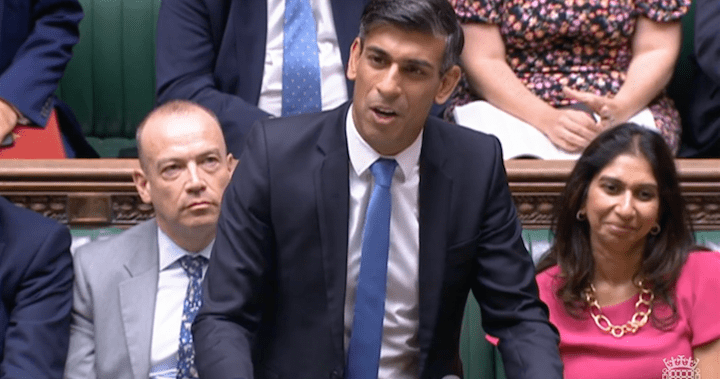Rishi Sunak didn’t use the same language as Gillian Keegan today when he returned to Prime Minister’s Questions. But he clearly also thinks people should be thanking the government for the good job it is doing.
The session was dominated by the concrete crisis in schools, but Sunak also wanted MPs to give him some credit for the economy recovering and inflation falling. He complained that both Keir Starmer and SNP Westminster leader Stephen Flynn had failed to mention these in their questions, and even rather boldly proclaimed that small boat crossings were down – despite them passing the 100,000 mark this summer and despite the Bibby Stockholm fiasco.
Sunak was very keen to labour that the proportion of schools with RAAC was very small
Starmer wanted to lay the blame for the concrete crisis at Sunak’s door. He also accused the government of being ‘cowboy builders’, claiming that they were doing a good job and demanding people thank them even as children were ‘cowering’ in their crumbling classrooms. He pointed out in his first question that the Prime Minister had halved the number of schools being rebuilt, even after the 2018 collapse of a roof in Gravesend.
‘The Prime Minister decided to halve the budget for school maintenance just a couple of years later. Does he agree with his education secretary that he should be thanked for doing a good job?’ Sunak used his first answer to argue that ‘we make no apology for acting decisively in the face of new information’ and to provide an update on the number of schools affected. He was very keen to labour that the proportion of schools with RAAC was very small. ‘The vast, vast majority won’t be affected,’ he said, adding that the government was assigning a dedicated caseworker to each affected school.
Starmer’s second question reminded Sunak that the Conservatives had cancelled the Building Schools for the Future programme on coming into office in 2010. He added: ‘The person who ran the department for education says he is personally responsible. On Monday he leapt to his own defence saying it’s utterly wrong to blame him. So why does literally everyone else say it’s his fault?’
Sunak knew that Starmer was going to mention that Labour rebuilding programme, and was ready with quotes about allocating money on the basis of ‘ideology’ and it being ‘time consuming and expensive. Just like the Labour party’. It was a good line, though the critique of BSF might have had more weight had Michael Gove not later said he regretted cancelling it.
A better argument from the Prime Minister was that the Labour leader was merely jumping on the ‘latest political bandwagon’ by asking questions on an issue he said Starmer and his party had previously taken little interest in. Starmer disputed this, saying Labour MPs had tabled questions on RAAC. After the session, Downing Street was asked why Sunak had claimed Starmer hadn’t raised the issue once when his education speech had referenced crumbling schools. The prime minister’s spokesman said Starmer ‘did not reference RAAC once’.
The defence from Sunak, though, did sum up Labour’s current challenge: people might not feel like thanking the Conservatives, but they’re not yet confident that Starmer’s party has got enough of a clue to take over.







Comments